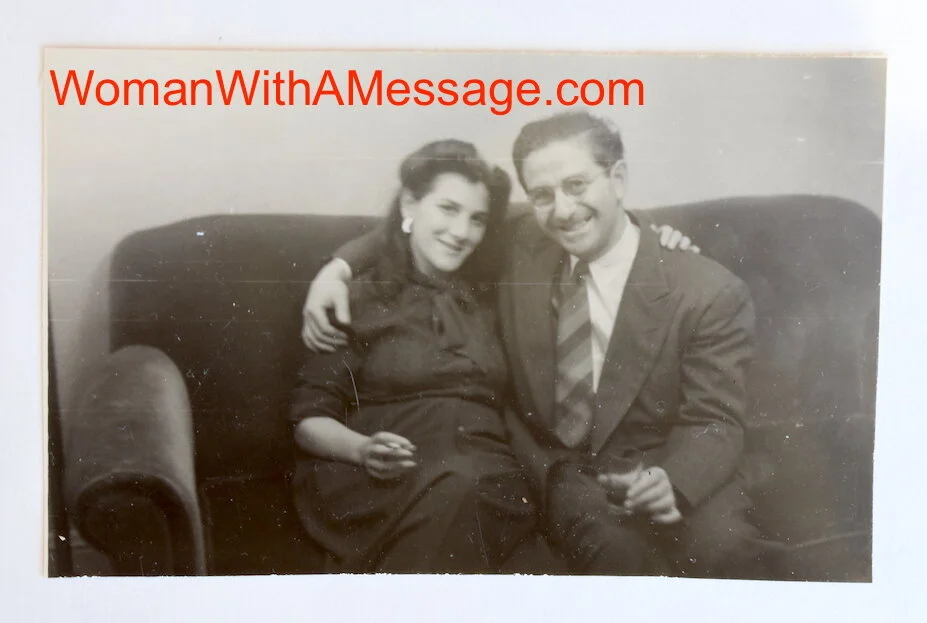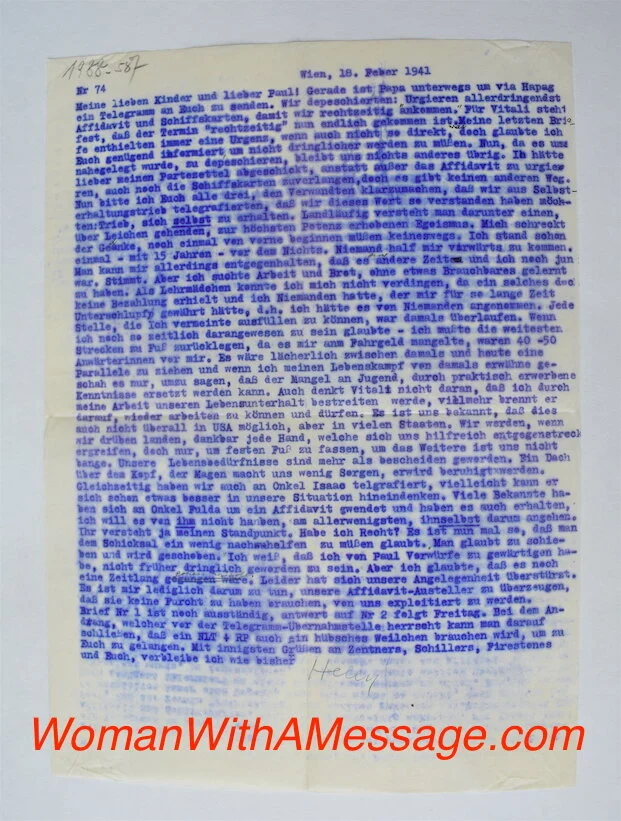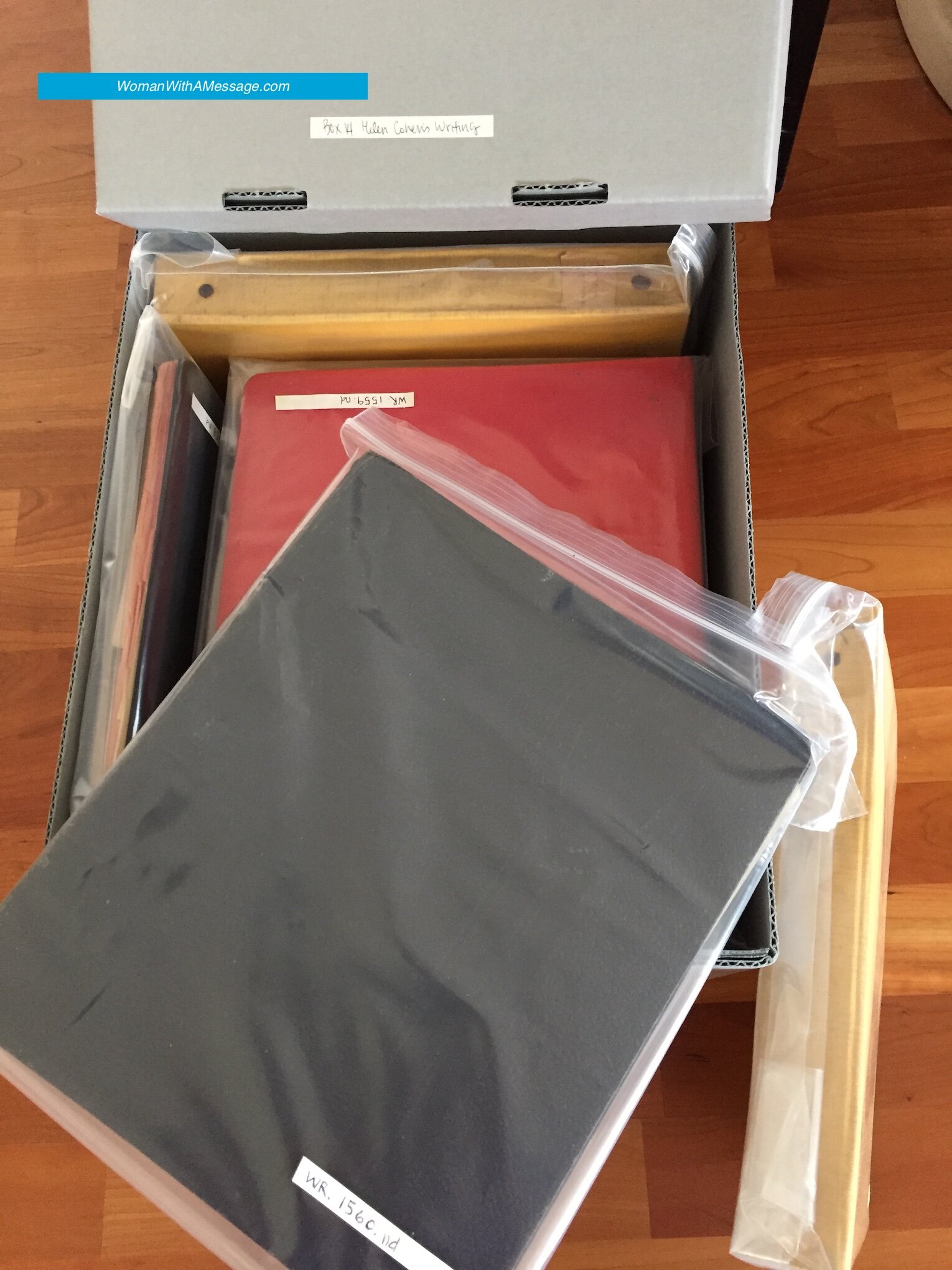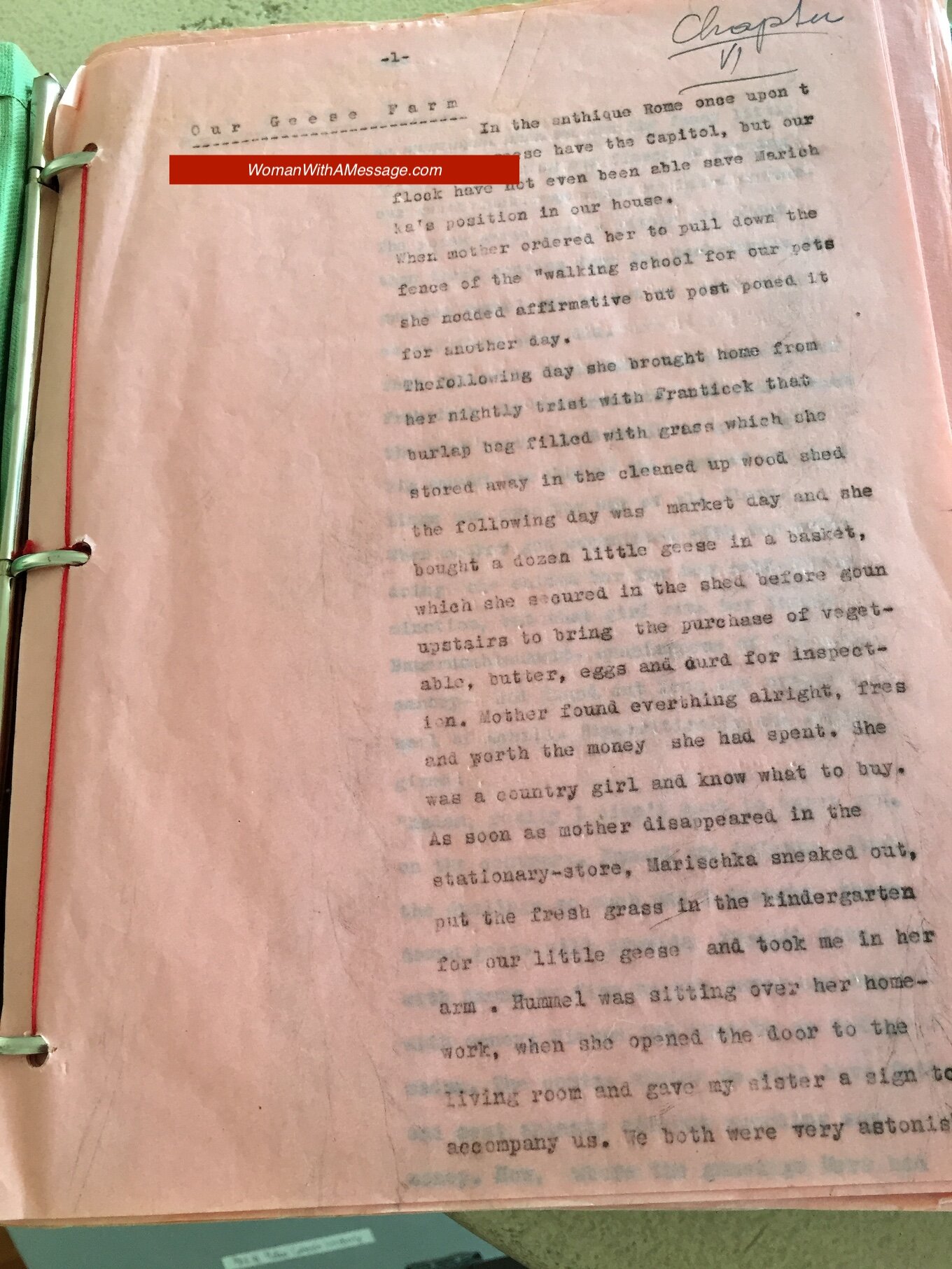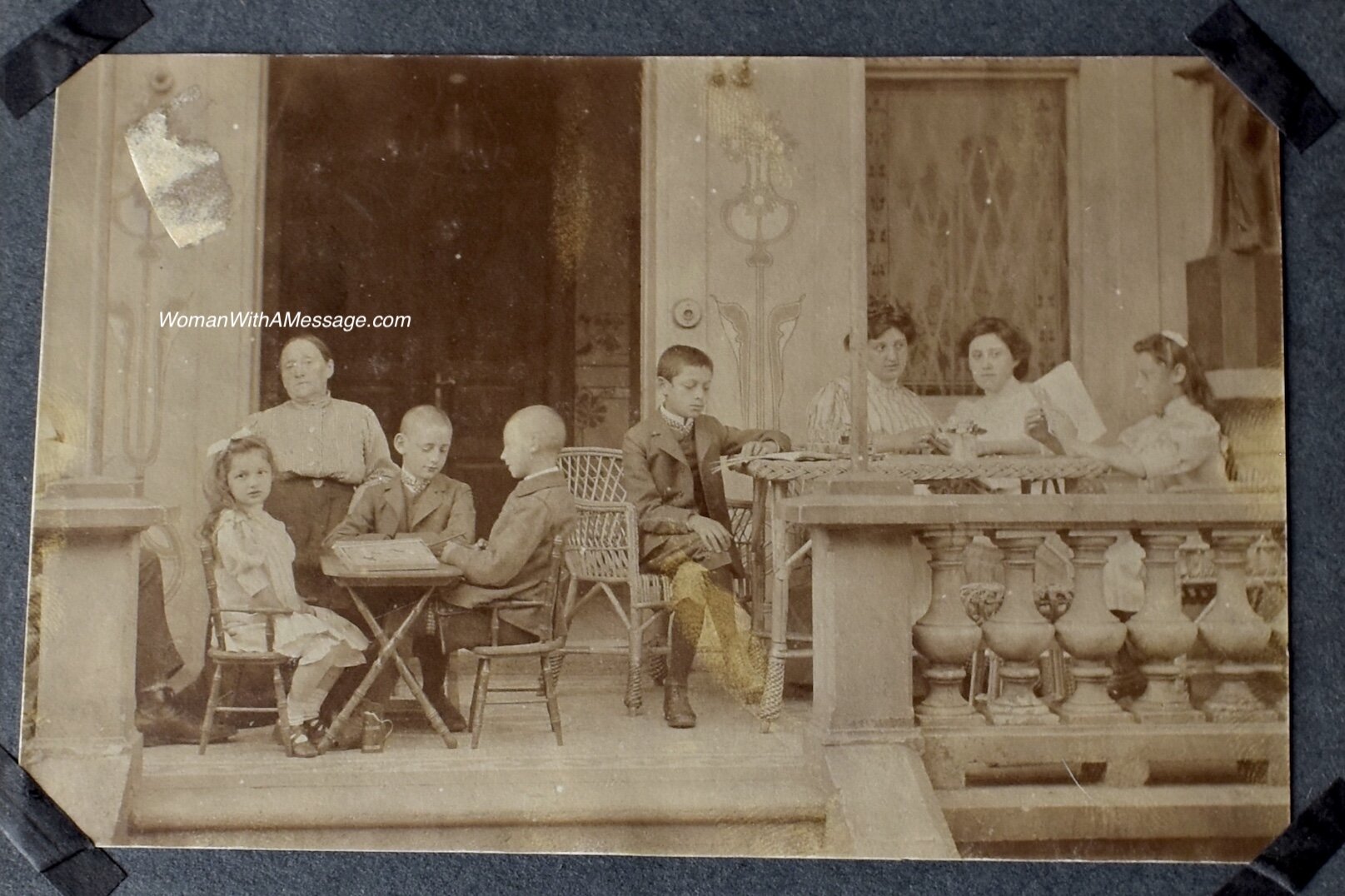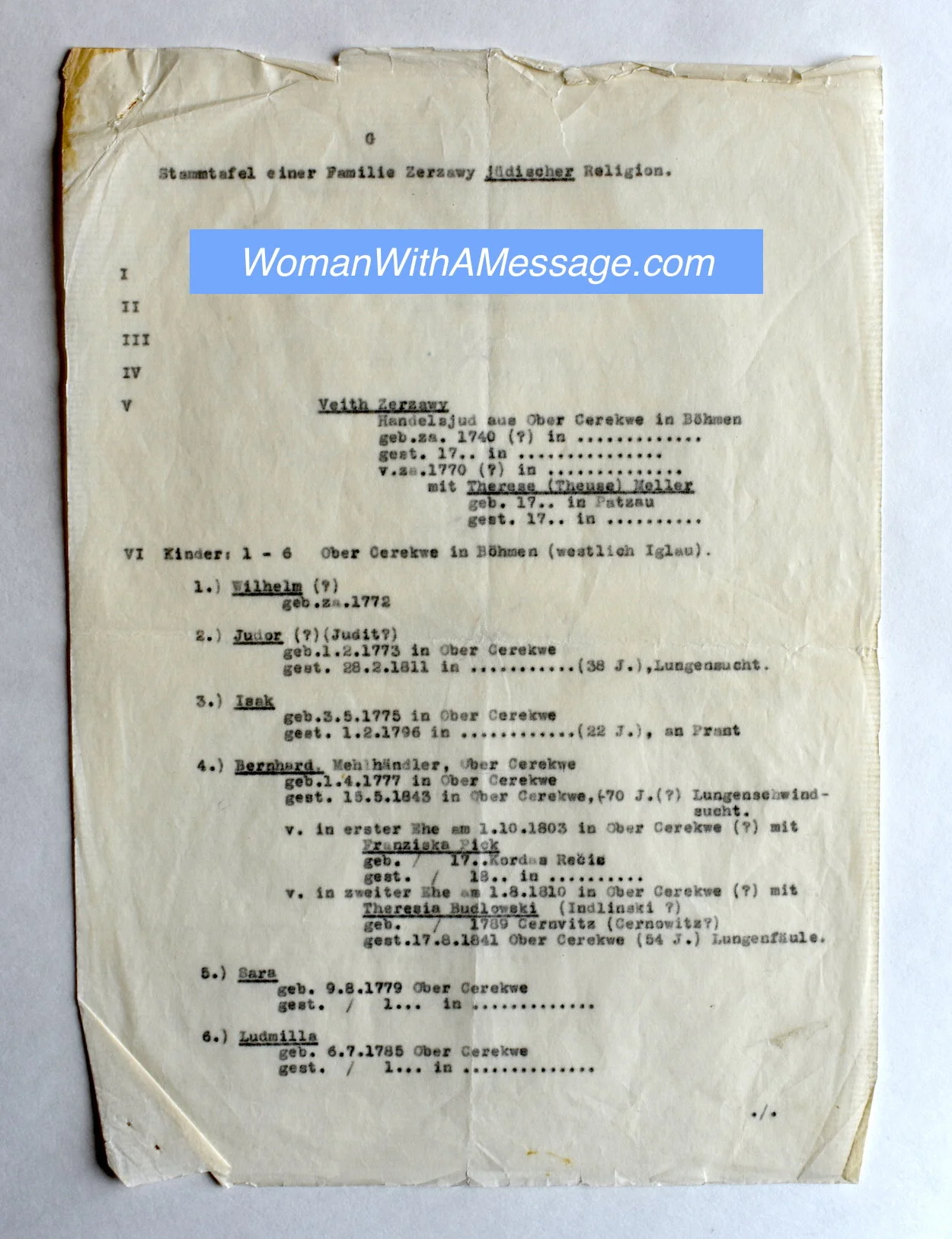Link to Family Tree to understand family relationships.
This long letter to Harry was written over the course of two days. Words in italics were written in English in the original letter.
Istanbul, 3 March 46
My dear, dear He-Hi-Ho-Hu-Harry,
I am so happy, so unspeakably happy to get mail from you and to know what one lives for. My happiness laughs out of your eyes. Everl’s face hasn’t changed as much as my piano-dissecting, washhouse-key-destroying, tooth-knocking-outing, not-wanting-to-learn-anything useless rascal, Harry. For the sake of the great services he has shown the U.S.A., I will forgive him for all this.
From Ebi, I got one of her patented telegram letters two days ago and she hid from me what her photo revealed, that she will need me soon. How vain mothers are, even when they think they’re being clever.
People have mothers or they don’t, but they’re not really necessary now in the time of the atom bomb. It’s no longer the modern style to write long letters I know, but I am not going to follow this trend any more than I did those of wearing yellow-orange lipstick or vermillion nail polish - I didn’t do that either. My son-in-law I am sure I will like very much. Here I sometimes see American newspapers with the picture section. What is wrong on it? The happy Goldsmith family photo is incorrect – it says that he drinks and she doesn’t. (I am upset about it.) And that she smokes and he does not. (I am even more upsetter)
Harry, what you all suspected is right. In this I recognize that you are more the children of your father than mine. You are very intelligent, but in one point you lack Vitali’s spirit. Letters which cannot be delivered remain at the main post office for three months before they are sent back. In case there is a demand, your letters would have been presented in a packet. Doesn’t matter! As long as we were together, I never thought that I could become old. I thought that I would always remain young with you, always understand your tricks and jokes. Papa’s sparkling temperament contributed a lot to that. I believed that nature would forget to have me get old. Sometimes in the autumn when November storms caused the leaves overnight from the trees on the Ringstrasse to fall, I sometimes saw one or two trees that still had their green leaves and it looked as if they were strong enough to weather the winter storms. But that was just the appearance of it. A few days later they were just as bald as all the other ones. I lost my green leaves and I am so glad that you still love the Helen-tree that has lost its leaves. Inside I am not really that old; and if you want to decorate me like a Christmas tree, nobody will see on me what kind of storms I survived on the Lüneburg Heath [where Germany surrendered May 4 1945, a three-hour drive from Ravensbrück] and on the Sea of Marmara [Istanbul].
Now, however, let’s get to the matter at hand. Every month transports leave here directly to America. Of course, soldiers are taken first. Some ships have a policy of not taking women on board. Thousands of students are also waiting for a spot on a ship. I don’t dare think about the possibility of flying. Everl thought I wouldn’t want to fly. Really? Didn’t I go through training for that with you on the Hochschaubahn [roller coaster in Vienna’s Prater]? I would, if I had to, dare to take this trip in a herring barrel. A good thing that came out of the “University of Nazi Germany” is this: Nobody is afraid, nobody who survived it knows fear. The only fear is fear of yourself, in other words, the fear of fear. It is as if someone who suffers from insomnia is tired and sleepy, lays down and the fear of not falling asleep means that he does not fall asleep. You advised me to go to the American Consulate and the Vice Consul is a “charming” person and he showed me the same consideration that you were shown at the Vienna Consulate back then. I was armed with your letters and at your advice, I will ask Yomtov to accompany me to the consulate. If the result is negative, I will send you a telegram with the request to contact the General Consul about the matter by telegraph.
I will, as Papa would say, take the matter into my own hands. Up until now I had to let the Joint Committee take care of it. But I believe, little Harry, that Yomtov and I will manage to take care of this. As I said, if not, we will send a telegram.
Since November I have been in touch with Robert. You cannot imagine how much moral support he has been for me. His dear devotion really gave me some courage. From March to November I got, other than 2 telegrams from Everl, no mail. Thank God that this bad time is over, and I hope I will soon find out from the Red Cross where Papa is living.
I was shocked by the death of Nathan. Poor, poor Hilda! I have not had the courage to send my condolences to her by letter. I wrote her several times, I also wrote to Bertha and Tillie.
Also, in Vitali’s family there have been some accidents in the last two years. As his youngest sister was visiting F, she suddenly, without any indication that she’d been ill, died. A brother-in-law of Ida Cohen jumped off the tram and ended up under a car and he was fatally injured. The daughter of Onkel Bondi got married when she was 17 years old. She was supposed to be a real beauty, and this is why she could marry without money. You know that this is only possible once every four years on a leap year. At age 18, she had the first baby, which was 9 months old in August. A second was on the way and the mother-in-law forced her to do something about it. She obeyed. 24 hours later, she was dead. Vitali’s brother is crushed. I did not know this niece, but I was also very concerned. I heard that there might be legal repercussions.
In the first months that I spent in Moda, I got quite a few visitors. But then I lived in Burgaz and then in Balat, both places which are hard to get to. When someone wanted to visit me, I was usually somewhere else, and I could hardly blame anybody if they don’t have a taste for this hide and go seek game. — Tomorrow, Monday, I will sneak out to Stamboul. I will see if I can get away with it. While I am writing to you, I am looking every now and then at your pictures. Is the young lady really my Everl, and isn’t she ashamed to be in such an intimate position with a man I do not know? And is the handsome young man who looks like a well-paid film star really my product? What is Paul doing? Why doesn’t he let himself be heard from? What is new with the Zentners and the Schillers? I am asking too many questions now all of a sudden, but you had a long quiet period from me, so I won’t even excuse myself for doing this. I greet all. Please say hello to everyone from me, including Robert, and tell him how much I thank him.
Harry, I hope the sky doesn’t fall which would rob me of my great fortune of being with you again.
I kiss you
Helen4. March 46
My dear little boy,
I read through what I wrote yesterday and I find that I didn’t go into enough detail about the most important points. Enclosed is a copy of a letter to the consulate. You see that I have made mention of the fact that you are or were a soldier. I don’t know if it was September or October. I think in October I got a letter from the San Francisco Committee for Service to Emigrées with a notification that my affidavit was dispatched on the 23rd of July and that I should get in touch with the consulate immediately. That happened after various reminder letters sent on my part and by the 15th of November, 1945, my papers were in order. At the beginning of November, we refugees moved from Moda to Antigoni. Our situation in life became much worse, and because of the worsening of our situation, the painful aftermath of the Kazet [aka KZ – the German word for concentration camp], and the constant worry about Papa, and of course about you, made it possible for me to go to Balat to a Jewish hospital for the poor. The only way you could survive that is with humor and iron will power. I recovered quickly and I would have been able to leave 14 days later, but the boss of the committee to stay as long as I could until they could find a better shelter for me. My living costs would be covered by the Joint until my entrance into the hospital. Because of this, I was assigned not to Joint but to the Cultus [sp?] community as their responsibility. Since I wasn’t costing Joint any money, it wasn’t important for the men here to worry about my case. They just forgot about me. On the 2nd January 1946, I left the hospital. All papers and my exit visa were ready. Suddenly, they got the idea to ask specifically of me money for the passage. I can’t really speak about it the way I would want to yet, but the men of the committee know what I think about this. Now that I know that you children are standing by me, I am regaining my courage. You wrote that I would be able to see from the affidavit that Eva works as a Nurse-Secretary. I have not seen the affidavit yet. The American substitute for a passport and the affidavit will be issued to me, but not until they tell me which ship I will be taking. At the consulate they told us that the Joint is getting the ship seats. Joint told me that the consulate would be dealing with the seats that are free first. Isn’t that cute? Isn't that right? The actual value of the consulate in Vienna - I found out about that when I was on the Drottninghölm where I had the time and opportunity to do some studies. I have to go. I want to go to Stambul, that is Pera, to the Consulate.
Kisses
Mutti
At first, I wasn’t going to comment on this letter because it’s so rich and can stand on its own. As I thought about how much information and feeling is packed into a few pages, I wanted to pause and appreciate.
Helene refers to photos of her children and how much Harry in particular has changed. He was just 15 when Helene had last seen him in 1939, and by 1946 he would have been 22. Eva was already 18 when she left, so was far more recognizable almost seven years later.
Below are photos of Harry and Eva – their Turkish passport photos from early 1939, one of Harry on the ship to the U.S. in October 1939, and one as a soldier in the 1940s with “laughing eyes”. I imagine this the photo of Eva and her husband Ludwig that Helene mentions – she holding a cigarette and he a glass. It’s possible that she was pregnant – Helene certainly thinks so. Eva suffered several miscarriages before I came along.
I imagine that Helene is referring to the photo of Eva and her husband Ludwig below – Eva holding a cigarette and her husband is holding a glass. It’s possible that she was pregnant – Helene certainly thinks so. Unfortunately, over many years Eva suffered several miscarriages before finally successfully having a child (me).
Looking at the letter from the beginning we learn something new every few sentences – the letter has few paragraph breaks – I have added them for clarity.
We learn that:
· In the second sentence, Helene summarizes Harry’s childhood antics in just a few words – my mother and Harry often joked about his dismantling the piano when he was a child. Of course, he was not able to put it back together so it ended up being an expensive experiment! Perhaps Harry is playing on the same piano in the photo below:
· Although Eva wrote to her mother about her marriage and sent a photo, she provided very little information about Helene’s new son-in-law.
· Helene sent many letters to her children but didn’t have the correct addresses for them so were not delivered (and eventually returned?). She bemoans that her children did not think to go to the post office to see if anything was waiting for them – Vitali would have done so. At least in the Vienna of her memory, mail got to its recipient even when the address was mysterious. This must have been awful for Helene who was finally “free” in Istanbul and able to write to her family, yet heard nothing from anyone but her nephew Robert in England.
· After all she has been through at the hands of the Nazis and in Istanbul, Helene has aged and no longer looks or feels as young as she once was. In Vienna, being a mother and married to charming Vitali who always kept her spirits up, she was able to feel that time stood still.
· The logistics and challenges of getting to America – Helene is willing to do whatever it takes to finally be reunited with her children.
· There have been many family tragedies, including the death of Hilda’s husband and deaths of several members of Vitali’s family. We see the effects of abortion when one of Vitali’s nieces was “forced to do something about” a pregnancy. Interesting to see abortion discussed in a letter – it was such a taboo subject when I was growing up that I couldn’t imagine someone writing about it. Was Helene more willing to talk about difficult things, especially after all she’d been through? Was it the result of her being the daughter of a journalist who sought to tell the truth or the fact that she and her husband were valued freedom of thought and lived a bohemian lifestyle? Interesting that Helene was Bohemian in both senses of the word – someone from Bohemia and someone who lived an unconventional lifestyle compared to those of her neighbors.
· Helene has little freedom in Istanbul and must “sneak out” to take care of business. Because she has been moved several times in Istanbul, relatives cannot find her to provide company and support.
· Helene had been in contact with a Jewish organization in San Francisco.
· After all she’d been through, Helene suffered what would have been called a “nervous breakdown” and was hospitalized for a few weeks. The Joint, the Jewish organization that had been supporting her stay in Istanbul, encouraged her to stay longer so that they would not have to pay for her lodging. She finds herself yet another kind of prisoner. For someone who had led an independent life and supported herself since she was 16 years old, these past years of powerlessness, loss, and endless bureaucracy must have been unbearable. Every time she thought she’d overcome a hurdle, another higher one was placed in front of her.



